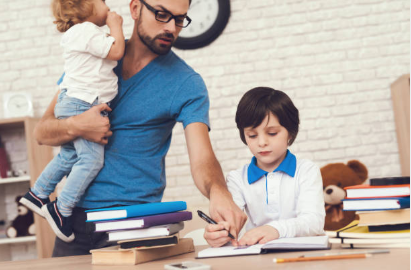Is there one type of parenting style that is the most beneficial for the development of a child? When you’re a parent, everybody has an opinion on your parenting style. You’re too harsh, you’re too lenient, you shouldn’t let them do this or that. It’s especially comical when it comes from someone who doesn’t have a child themselves. The one thing that is evident is the clear shift in parenting styles in the millennial generation.
Due to extensive literature and research in child development, we have come to realize how childhood can impact and form an individual. As a result, we want the best for our children and will do anything to ensure they get a proper upbringing that will lead to a life full of success and happiness. But, are we going too far?
Parenting in 2019
My friend and I planned a play date at the park with our children. As we were gearing up to head out, she collected a leash from her entryway cupboard. Without thinking I said, “When did you get a dog?” She chuckled and replied, “it’s for Charlie, she’s just too hyperactive when we’re walking”. I was polite in my response but in my head, I couldn’t help but criticise.
I know this is bad of me as every child is different. Some children require this method for their safety, but I couldn’t help to think that these certain restrictions we place on our children could be harmful later in life. I do think that my parent’s generation were a bit too lax in terms of child rearing, however we have definitely gone too far in the other direction, where parents are putting tracking chips in their children. It about time we found a happy medium in parenting styles.
I thought that there was only one term for this new age style of parenting- helicopter parenting. Upon further investigation I found that researchers have coined multiple terms for the type of parenting that we see in todays society. Each style of parenting is extreme in its own way and poses different advantages and repercussions for children. Some of the most popular include:
Tiger parents
Coined by Amy Chua, these parents push their children to succeed according to their own terms and interests. Some advantages of this authoritarian type of parenting are that the child can become more productive, motivated, and responsible. However, this high pressure can cause children to struggle in daily life or in new settings, which may lead to anxiety, poor social skills, and depression.
Helicopter Parents
Psychologist Foster Cline coined this term to describe parents who intervene in almost every aspect of their child’s life. Also known as over parenting, by hovering around they believe they are saving their children from failure. These are the type of parents who call their child’s university professor complaining about the mark they received on their 1,000-word essay. The benefits of helicopter parenting are just that; that the parent may be able to save their child from unforeseeable danger. However, in doing this children can lack independence, causing them to be lazy, or cause lack of emotional resilience.
Free-range Parents
Parents who adapt to this approach aim to give their children the childhood they had in the 80’s/ 90’s. They believe that the environment is the best teacher and children should learn completely on their own. Psychologists believe that this style of parenting is in response to the new age anxiety-driven style of parenting. Children are more autonomous and have more freedom to manage themselves in their day-to-day. As a result, children can be more resilient and take more responsibility for their own actions and handle their own mistakes. Studies show that this style of parenting tends to lead to happier adults. However, parents do hold a lot of wisdom that they can pass down to their child. By withholding some of this wisdom, their children can be exposed to dangerous situations that they may be naïve towards, leading to greater harm that could have been avoided.
Attachment or Gentle Parents
Coined by John Bowlby and Mary Ainsworth, this style of parenting enforces strong physical and emotional attachments to at least one caregiver that are critical to a child’s personal development. These parents have a very relaxed approach to parenting while setting limits that coincide with the child’s needs and character. This style of parenting promotes the child to be confident with themselves as well as their relationship with others.
Gentle parents tend to balance high expectations with empathy and work towards the best outcomes for their children. This allows the child to feel more like an equal and provides an environment where the child feels love and stability, but also allows them to experience the world on their own terms. However, this style of parenting is often grouped with permissive parenting where it places too much onus on the child and lacks an authoritarian approach where the child learns from being told what is right and wrong.
A Healthy Medium Between Authoritarian and Permissive Parenting
When examining these parenting styles, it seems that they are either too authoritarian or too permissive. The advantages of the permissive parenting styles is that children have more autonomy and are generally able to problem solve independently. However, this may cause them to lack discipline or a structured learning environment that promotes structure and perseverance later on in life. For more authoritarian parenting styles, it works out the exact opposite where the child will have more structure later in life, but not as self-sufficient.
According to research, there are many pros and cons to the hyperactive parenting approach. It helps to develop confidence, character and trust between parent and child. When being a hyperactive parent it is important to be age appropriate. The more overprotective and intense you are as your child grows, the more likely they are to rebel and have weaker problem-solving skills. The cons associated with hyperactive parenting don’t only affect the child, they also affect the parent. This can be extremely exhausting and could in turn affect your relationship with your child as they may hold some resentment.
What Does Research Say?
According to Dr. Rebecca English, a lecturer in Education at Queensland University of Technology, “You often have trouble seeing your child as a fully formed adult, even when they are.” As a result, your child will feel they have to be sneaky or discreet in anything they think you might disagree with. Dr. English states that there is a stack of evidence that suggests that over parenting has more negative consequences for children. She states that helicopter parents prevent their children from developing emotional resilience. Because they are unlikely to learn from their own trial and error, they may be hesitant to try new things, essentially being afraid of failure.
Dr. English also states that, “they may also lack independence as they grow up and rely on their parents in an inappropriate way.” In saying this, hyperactive parenting can lead to some positive traits. Children of hyperactive parents tend to be more prepared for activities, arrive on time, and do their homework… with no interruptions from their hungry dog. This is not to say that a more relaxed approach to parenting is more beneficial. When you have a more relaxed approach to parenting, you aren’t as familiar with your child’s day-to-day. Through trial and error the environment may be the best teacher, but at what cost? If your child has too much liberty, they may not know boundaries and risk the possibility of not knowing when to say no.
Thoughts From ToBeMe:
Being a parent is no easy job. Every child is different and requires specific attention or parenting styles catered to their needs and character. We tend to choose a parenting style that is a result of our upbringing or situation. We must stop and think, “is this what’s best for my child?”
These types of parenting are culturally dependent and there are many factors that will affect parenting styles as society progresses. Some factors include technology, the change in family dynamic, geographical location, accessibility to certain resources (i.e babysitting, day care), and government assistance. Parents in one part of the world may not have the same resources as a parent in another part of the world. Some countries may have government funding that makes childcare and maternity leave more affordable. Other countries may have no support systems in place for parents, causing them to be more lax in order to provide for their family.
What Parenting Style is Best for You?
It is important to remember that children aren’t just children, rather they are adults in training. We aren’t raising an infant. We are raising a fully competent, intelligent and self-sufficient adult. In anything we do as parents, we have to put the needs of our children first. Children aren’t our property and they don’t belong to our time. They belong to a time and generation that we can only attempt to understand.
Ensure your parenting style is an even mix between authoritative and permissive parenting. Try to cater your parenting approach to the situation at hand. It’s important to give your child a long enough leash to explore through trial and error. However, ensure that leash is tight so your child still views you as an authoritative figure that makes the rules.
Our next blog on 5 Tells of Anxiety in Children will be released on Wednesday June 26th. See you in two weeks!
Comments are closed.






